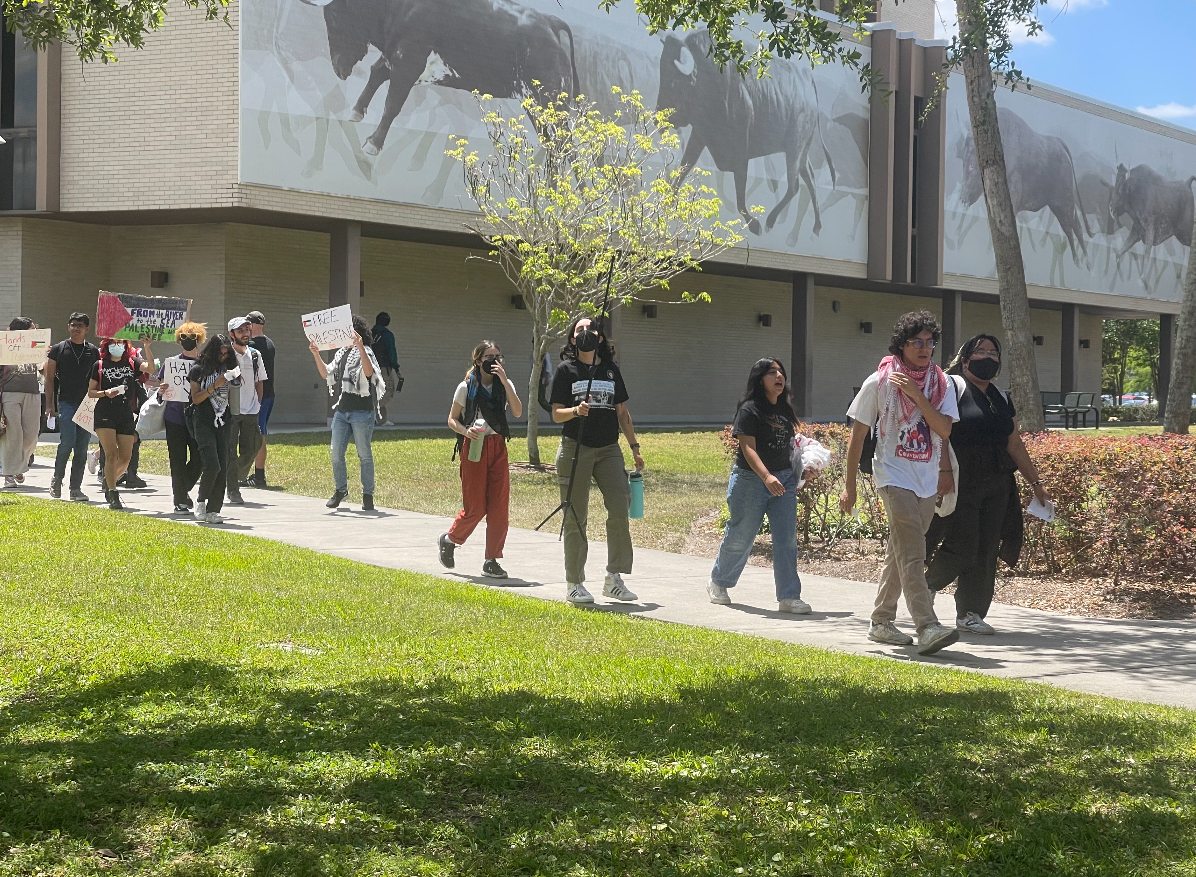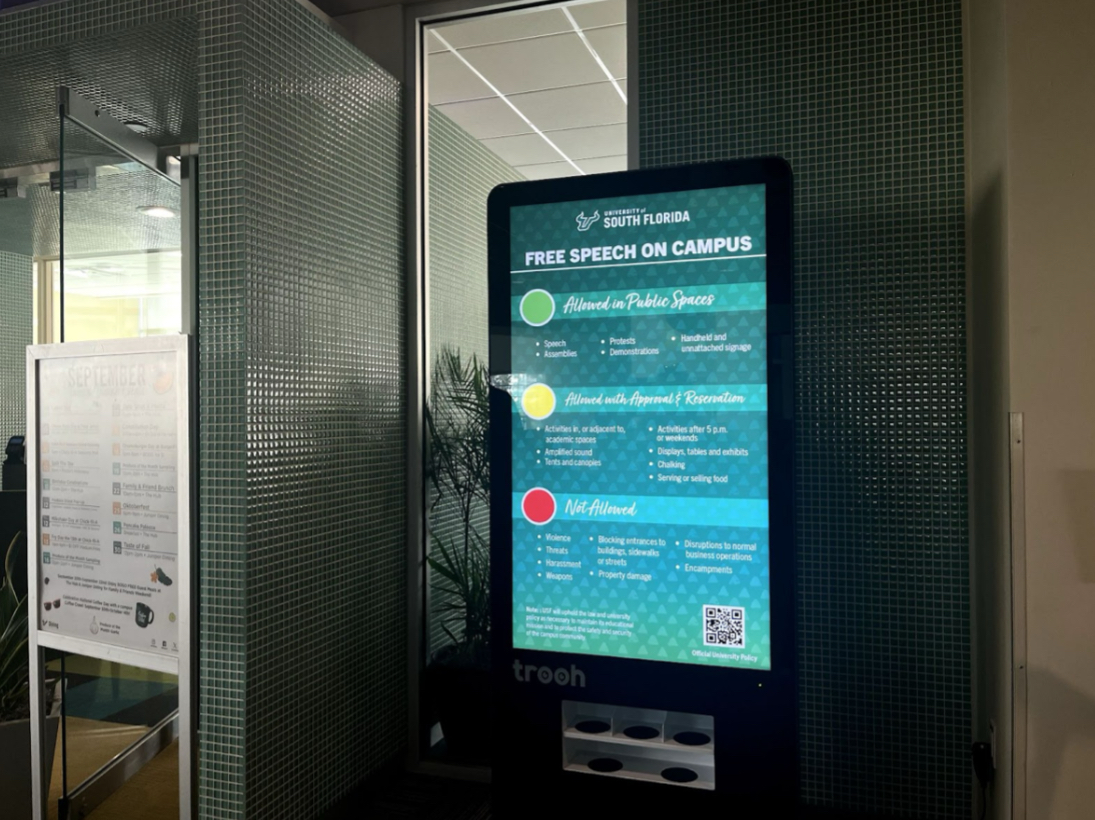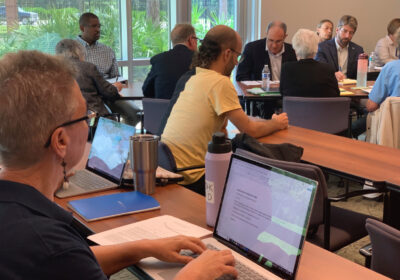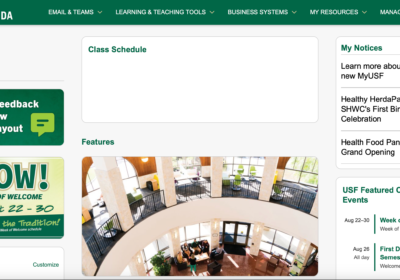USF students are divided over new on-campus gathering policies

USF’s amended Student Code on Conduct policy has divided students, with some fearing that the policy restricts campus engagement and others finding it necessary for maintaining order.
According to policy 6-028, the regulation of on-campus proceedings aims to enhance safety and prevent disruptions to university operations and academic activities.
This new approach was introduced following April’s on-campus protests and establishes a framework for students and organizations to ensure that events comply with USF’s standards.
Related: Protesters at USF need pre-approval to gather with amplified sound and displays
The policy outlines which events require prior approval, including those involving sales, tables, amplified sound, such as elevated voices or volume, and those held outside business hours.
It states that organizations must book a space 14 to 30 days prior to holding an event on campus.
President of the First Amendment Forum Alice Messiah said she is hopeful about the policy. The forum is a student organization which aims to help cultivate a community that embraces the merit of the First Amendment, according to its website.
After discussing it with administration, Messiah reassured students that they should not be discouraged by the new policy.
“I have been assured that students will be able to express themselves on campus,” Messiah said. “This makes me believe that the administration cares deeply about freedom of speech on campus.”
Messiah also encouraged students to engage with university leadership and advocacy groups, especially when feeling discouraged about some decisions.
However, other students have not been pleased with the changes.
Ariana Roman, a junior political science and economics major emphasized the difficulties in obtaining consent and said the form approval process lacks efficiency. Roman is also the president of USF’s acapella group Tones of Gold.
“Getting permission is not an easy process at all,” Roman said. “There’s multiple people who oversee the process, so it’s not very streamlined.”
Roman said the new restrictions on acquiring permission to post flyers in USF buildings limit organizations’ ability to promote events. According to the policy, signs and notices can only be placed on authorized boards, A-frames or door card holders, and cannot be attached to other university property.
“I remember walking through campus and seeing flyers everywhere for different organizations and different events,” Roman said. “Now when I walk through the halls, I just see the tape where those posters used to be.”
The policy’s limitations on table usage have been a challenge for People Power for Florida, where she also works, according to Roman.
The organization seeks to help increase voter registration and often visit college campuses as part of their mission, according to its website.
Roman said that, without prior approval to set up their booth, the only way they could collect voter registrations was by canvassing around campus with a clipboard.
“This has shifted our way of collecting voter registrations and has reduced our ability to collect them,” Roman said. “People are in a rush and going up to them instead of them coming up to you is a less smooth process.”
Other students, like Hannah Thieryung, sophomore history graduate student, have shown similar concerns.
“Given that the university is trying to build up student engagement, putting increased policies and rules surrounding how students can hold and run events isn’t going to really help matters,” Thieryung said.
As president of the Irish Culture and Language Club, Thieryung said she is troubled about the lack of clear guidance for students navigating the new requirements.
“They don’t exactly tell you how to do all of this when you take over,” Thieryung said. “They don’t really hand you a simple, concise guidebook.”
Despite USF’s efforts to disseminate information about the policy on screens in the Marshall Student Center and collaborate with student organizations to improve understanding, some students still raise alarms about insufficient counsel.

Hanna Lindemann, president of the Read-a-Bulls club, said the challenge is not a lack of support for student organizations, but rather a lack of guidance.
“Updating presidents and vice presidents at the beginning of the semester on our policies and general information – how to reserve a room or how to sign up for Bulls Market – could help a lot,” Lindemann said.
While some students expressed concerns about the new policy’s impact on campus engagement and the university’s direction on it, others saw the changes as manageable.
Fariza Bhuiyan, president of the Campus Activities Board in the Tampa campus, said, while the policy may delay event organization, it won’t necessarily decrease engagement.
“Students want to keep doing events no matter what,” Bhuiyan said. “I just think it might delay the process for organizing events.”
While opinions on the policy vary, some students acknowledge its intent to support on-campus safety.
“There’s wisdom in a lot of that,” Messiah said when talking about the policy’s intention to minimize disruptions to academic work. “I think USF stands for freedom of speech, both before and now.”
Lindemann was also optimistic, suggesting that the policy is designed to support student well-being.
“I think they’re trying to help us and make sure everybody is okay,” Lindemann said.







